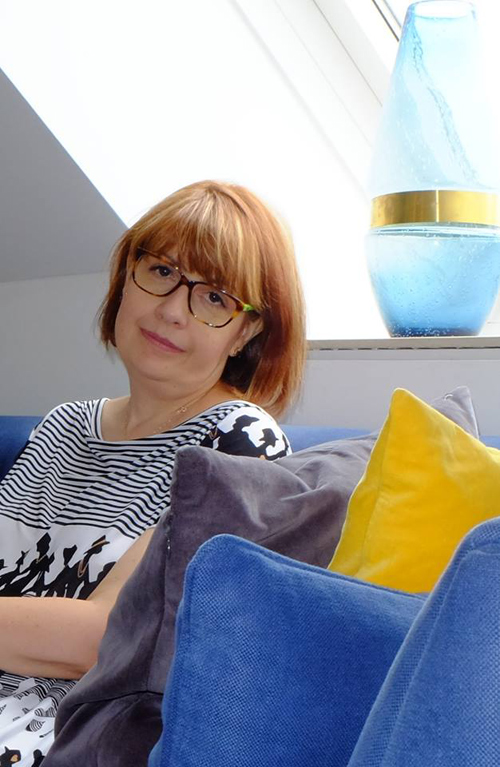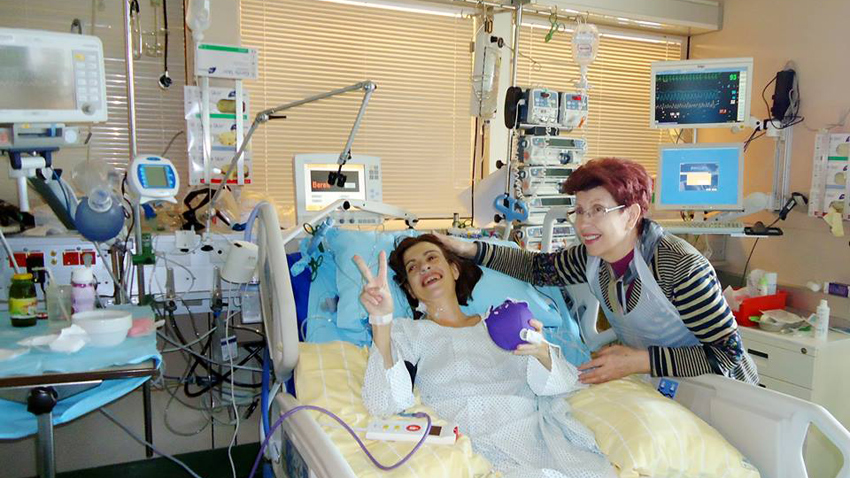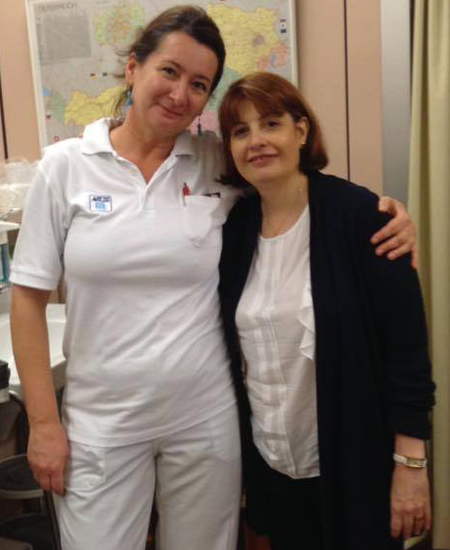 The personal story of Natalia Maeva is exciting and inspiring because of her great courage and will for life. At the same time, her story raises many questions about the situation of the Bulgarian healthcare system. Back in 2009 Natalia was diagnosed with pulmonary arterial hypertension. "At that time the Bulgarian state did not provide adequate therapy and my family had to pay for it," Natalia says.
The personal story of Natalia Maeva is exciting and inspiring because of her great courage and will for life. At the same time, her story raises many questions about the situation of the Bulgarian healthcare system. Back in 2009 Natalia was diagnosed with pulmonary arterial hypertension. "At that time the Bulgarian state did not provide adequate therapy and my family had to pay for it," Natalia says.
Pulmonary hypertension is a rare disease that cannot be treated and only maintenance therapy exists. Over time breathing becomes difficult, movements start causing fatigue. Small arteries in the lungs get narrower and the heart pushes the blood through them with difficulty. In the last stage of the condition, bilateral lung transplantation is required. In 2014 Natalia's condition started worsening. "I always carried oxygen with me. In such a state a person is isolated from society. But I was trying to do other things," Natalia says. She has been actively working for the Bulgarian Society of Patients with Pulmonary Hypertension, helping other people with such a diagnosis. For eleven months she was waiting for a suitable donor. And just when she thought that would not happen, she received the long-waited call. But she was not afraid. "I had already reached a point where I had nothing to lose. It was the only logical step to take." The transplant operation took place at the University Hospital in Vienna. Here's how Natalia describes the emotion to wake up after transplantation:
"This is an amazing experience. You feel like you're flying. But you do not know how to breathe normally, because as you had been sick for so many years, you've lost your normal rhythm of breathing. And you start from the beginning; you actually learn to breathe in and breathe out. It took me about three months."

After the transplant, struggles did not end because “one has to think about the three-month stay in Austria. The Bulgarian state gives you the money for the operation and that’s it. From there on you cover the other expenses. That's why I thank everyone who helped me and continues to do it," Natalia says.
Is it a feat for a Bulgarian patient to receive a transplant?
"For some it is a feat actually, because in order to do this, you have to fight the system. This is not easy at all in Bulgaria. Getting financing, meeting the commission's requirements for treatment abroad – it is hell. When a patient needs a transplant, they do not have time for all this struggle, carrying documents and letters from hospitals around. Every single day is important and here the patient has to make their own path. If they are unable to struggle and are not physically capable of doing all that, they simply die.”
 Transplantation takes place abroad, as there are no conditions to do this in Bulgaria, Natalia points out. She summarizes the priorities of the Bulgarian Society of Patients with Pulmonary Hypertension as follows:
Transplantation takes place abroad, as there are no conditions to do this in Bulgaria, Natalia points out. She summarizes the priorities of the Bulgarian Society of Patients with Pulmonary Hypertension as follows:
"Among our main tasks is the establishment of a post-transplant monitoring center for lung-transplant patients in Bulgaria. We are forced to travel for medical examinations in Austria. This is associated with huge financial resources, as there is no monitoring center here. We are actually currently monitored at the St. Ekaterina University Hospital in Sofia, which is specialized in cardiovascular diseases.”
Today, after all the obstacles, Natalia Maeva makes specific recommendations that would help people with pulmonary hypertension:
"We need to create a national lung transplant program. People in small towns do not know how to win against the system. Clear rules must exist. Patients who are told they need lung transplant also need to know what the next steps are. It is important to have a post-transplant center operating in Bulgaria with doctors trained in Europe. There are transplant patients in Greece, Romania, and Bulgaria. If such a center existed here it would encompass the whole of the Balkans."
English: Alexander Markov
Romania becomes the largest natural gas producer in the EU Romania was the largest natural gas producer in the EU in 2024 and in 2027 the country will double its production thanks to the Neptun Deep project. This was..
The year 2024 was marked by political instability and confrontation - not so much over ideas for solving Bulgaria's long-standing governance puzzle, but rather over personal egos and individual agendas. This turbulent year shaped the political landscape,..
The clock on the facade of the State Puppet Theatre in Stara Zagora has long been a symbol of the city. It was set in motion in 1977 and is unique on the Balkan Peninsula. The theatre recently shared details about the clock on its Facebook page after..
From the first attempts to fly with homemade wings back in the 19th century, to the world's first combat flights with reconnaissance and bombing..
Dear friends, we are happy to announce that the Bulgarian National Radio’s QSL cards for 2025 are now available. The two series – one with 6 postcards..
Babinden, or Midwives' Day, was once again this year celebrated across the country with songs, dances and ritual re-enactments. The day of midwifery was..

+359 2 9336 661
